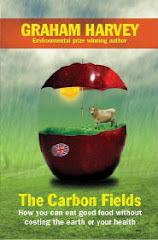The headline ran: “GM bean could help prevent heart attacks.” What followed was a thinly disguised publicity puff for Monsanto’s latest gift to humanity – a GM soya bean whose oil apparently raises blood levels of long-chain omega-3 fatty acids in people who consume it. This will protect them against heart disease and diabetes, we’re told, while speeding the growth of brain cells in the young.
The best source of long-chain omega-3s is, of course, fish oil. That’s why the Food Standards Agency recommends that we all eat a portion of oily fish each week. But as The Times reminds us, fish stocks are fragile. It seems we’re about to change our hostile attitude to all things GM when the new soya oil turns up in our yogurts, salad dressings and cereal bars.
Quite why journalists are so ready to swallow this corporate mythology is beyond me. The fact is there are safer, healthier ways to get omega-3 fats even if the supply of fish oil does run short. For a start would could free our cattle from their factory farms and put them back on fresh, green pasture as nature intended.
Many industrial countries now house beef cattle in vast sheds and feed them on industrial grains – the sort agribusiness companies like Monsanto supply the chemicals to grow. There’s plenty of evidence that grass-fed beef contains far higher levels of omega-3s – including the important long-chain variety – than the beef of cattle fed on grains.[i]
One of the reasons our diets are now so dangerously low in omega-3s is that industrial farming chooses to feed grains to ruminant animals in place of grass.
To add a sort of spurious objectivity to its biotech promotion, The Times carried a comment piece from the director of Rothamsted Research, a publicly funded agricultural science institute. Not surprisingly the research chief was generally in favour of GM technology, suggesting that the world may need it to feed a soaring population.
It’s a technology that also happens to support tens of thousands of science jobs around the world. In the 1970s the British research establishment identified genetic engineering as a priority area. They persuaded governments to pour millions into this area of research. Between them taxpayers and large corporations have staked billions on biotech research, which is why scientists are so keen to promote it.
What the world urgently needs is research into biodiverse, carbon-capturing, healthy food-producing agriculture. But the corporations won’t fund it because there’s not likely to be a lucrative product for them to sell at the end of it. And governments won’t fund it because they’ve been conned by corporate science into believing the only productive form of farming is the high-input variety.
It isn’t, but until the politicians, science and the media begin to seriously scrutinise the corporate view nothing much is going to change. The rest of us will have to put up with a more polluted planet and a less secure food supply than we need have done.
* If Rothamsted scientists are interested in finding out more about sustainable forms of farming I’d be happy to lodge a few copies of The Carbon Fields with the institute’s library.

2 comments:
Graham, we seem to be in a state where whatever the biotech companies say is seen as gospel. It started with the old mantra 'GM can feed the world' and progressed to comments that anybody who challenged that were accused of supporting genocide in Africa by not allowing GM crops to be grown there.
A while back the biotech PR train was openly saying that now environmental groups were preoccupied with climate change and peak oil it was an ideal time to relaunch a more aggressive campaign in Europe. And boy have they done just that.
Why The Times falls for their hype is probably down journalists liking bold headlines, it sells papers. It could also be just lazy journalism i.e. a story handed to them which did not need any research. Dangerous!
Great article Graham. I totally agree - why not just eat more grass fed beef which is exactly where you'll not only find high sources of omega 3s but also just a cleaner, leaner protein. You should definitely check out http://www.grassfedparty.com It's an online social community for sustainable agriculture and sustainable living. I enjoy your blog.
Post a Comment